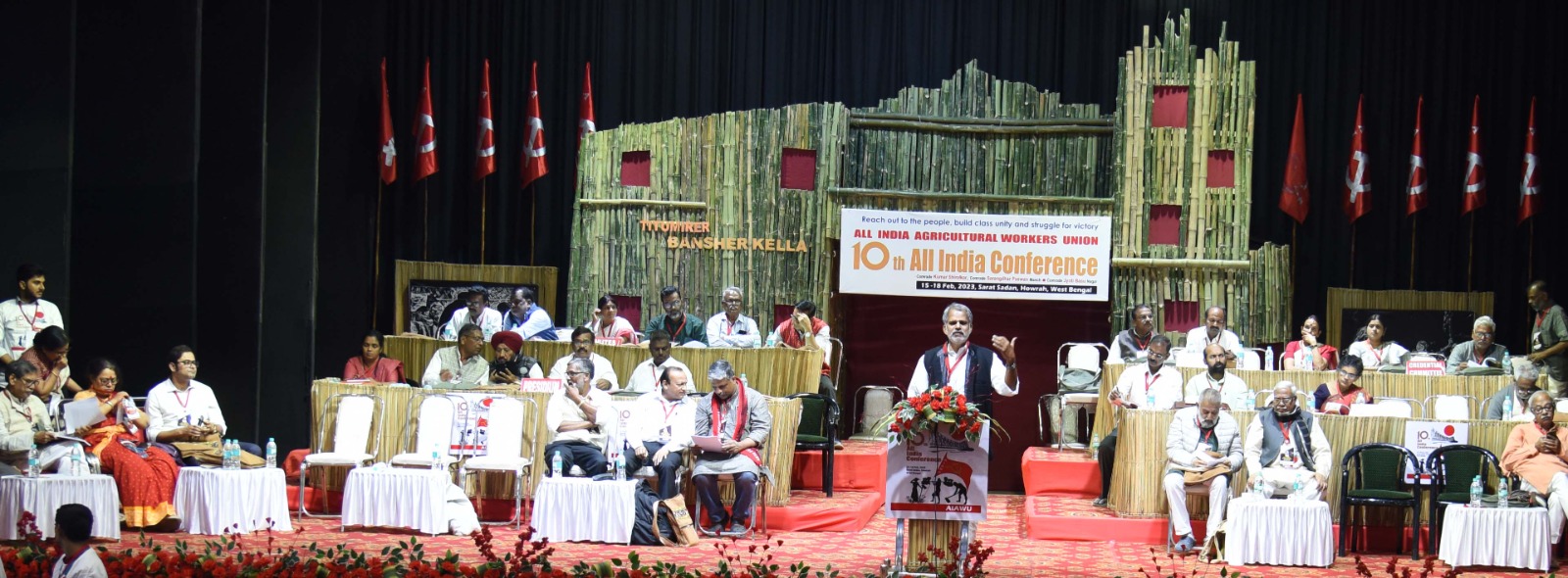
THE 10th all India conference of the All India Agricultural Workers Union (AIAWU) began on February 15, at Sarat Sadan, Jyoti Basu Nagar (Howrah) in West Bengal. Amidst slogans of ‘Inquilab Zindabad’, AIAWU president A Vijayaraghavan hoisted the union’s flag. Before the flag hoisting, five torch-marches reached the venue and handed over the martyrs’ torches to the all India leadership of the union and to the reception committee of the conference. These five torch-marches started from villages of martyrs and reached Howrah on February 15.
As revolutionary songs were being sung by 101 artists, leaders of the union and the delegates paid homage to the martyrs. AIAWU national conference from February 15-17, is being held in West Bengal for the first time after the formation of the state unit of the agricultural workers' union. It is essential to note here that only recently the union started its activities in West Bengal, and in a difficult time when an anti-democratic atmosphere fanned by the Trinamool Congress regime exists. But the union is steadily expanding its organisation and struggle in West Bengal, braving the violent attacks by the TMC and also fighting the communal agenda of the BJP and the RSS.
The seven-member presidium elected for the conference comprised A Vijayaraghavan, Amiya Patra, OS Ambika, A Lazar, V Venkateswarlu, Bhup Chand Channo and Brij Lal Bharti. Amiya Patra placed the condolence and Vikram Singh placed the martyr’s resolution in the conference. Sridip Bhattacharyya, chairperson of the reception committee delivered the welcome address. 986 delegates and observers attended the conference representing 75,56,013 members in 20 states.
The inaugural session began with the presidential address by A Vijayaraghavan. He presented the crux of the political situation of the country. The focus of the speech was on the impact of neoliberal policies on agricultural workers. He explained that sustained agrarian crisis is forcing small and marginal farmers to leave farming. The number of agricultural workers has increased over the years, but the working days in agriculture have decreased many folds resulting in colossal unemployment and migration among agricultural workers and other rural poor. The economic crisis resulting in slow industrial growth has failed to provide alternate rural or urban employment to these masses. The real wages of agricultural workers are not increasing over a period of time. Under the impact of neoliberal policies, as mentioned earlier, the number of landless and homeless are growing. We are witnessing the reversal of land reforms, especially in the last two decades. With the further withering of the social welfare State, the lives of agricultural workers are becoming more uncertain and insecure. This is the high time to demand legal security in the form of a comprehensive central legislature for agricultural workers ensuring decent work, working conditions, wages and social security measures for them.
He called upon the conference, “The only silver line in the current political situation is the growing upsurge by the working class and peasantry against the neoliberal economic agenda of the BJP central government, which was reflected in the mass participation in the year-long successful kisan agitation. Our union was an integral part of that movement. The experience of the kisan movement has added confidence to consolidate our future struggles. We have experienced struggles on fundamental class issues of land and housing. A few struggles on the issues of wages were also conducted. Being a class organisation of the rural proletariat, it is our prime responsibility to unleash struggles on the class issue of wage and land. This should be the clarion call of this all India conference. All the workers of rural India should be united in class struggle against the ruling class.”
B Venkat, AIAWU general secretary placed the general secretary’s report in the conference. The report has four parts, first one deals with the political, both national and international situation; second part deals with the situation of agricultural workers, third one deals with the experience of the struggles during the last three years and the forth part discusses the organisation in detail and explains the future tasks.
VS Nirmal, secretary of Bhartiya Khet Mazdoor Union extended greetings and solidarity to the conference and appealed for joint movement of organisations of agricultural workers on common issues.
Tapan Sen, CITU general secretary, greeted the delegates with an appeal to unite the workers in rural India. Kaninaka Ghosh, secretary of the All India Democratic Women’s Association and Himaghnaraj Bhattacharyya, general secretary of the Democratic Youth Federation of India also greeted the all India conference. There will be huge public meeting on February 17, which will be addressed by Pinarayi Vijayan, chief minister of Kerala and Polit Bureau member of CPI(M).


